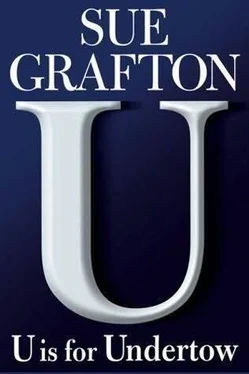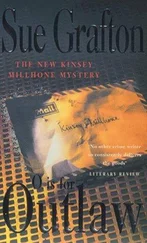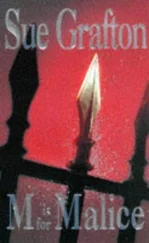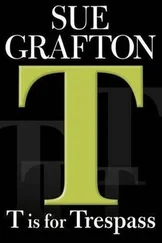I returned to my desk, congratulating myself on a job well done. Nothing makes a room look messier than a wastebasket full of trash. As I settled in my swivel chair, I glanced down and spotted the vellum envelope, which had apparently missed the plastic bag and now lay on the floor. I leaned over, picked it up, and stared at it. What was going on? Instead of happily winging its way to the county dump, the damn thing was back. I’m not superstitious by nature, but the envelope, coupled with Michael Sutton’s reference to his family estrangement, had set an old train of thought in motion.
I knew how treacherous and frail family bonds could be. My mother had been the eldest of five daughters born to my grandparents Burton Kinsey and Cornelia Straith LaGrand, known since as Grand. My parents had been jettisoned from the bosom of the family when my mother met my father and eloped with him four months later. She was eighteen at the time and came from money, albeit of the small-town sort. My father, Randy Millhone, was thirty-three years old and a mail carrier. In retrospect, it’s difficult to say which was worse in Grand’s eyes, his advanced age or his occupation. Apparently, she viewed civil servants right up there with career criminals as undesirable mates for her precious firstborn girl. Rita Cynthia Kinsey first clapped eyes on my father at her coming-out party, where my father was filling in as a waiter for a friend who owned the catering company. Their marriage created a rift in the family that had never healed. My Aunt Gin was the only one of her four sisters who sided with her, and she ended up raising me after my parents were killed in a car wreck when I was five.
You’d think I’d have been pleased to discover the existence of close kin. Instead, I was pissed off, convinced they’d known about me for years and hadn’t cared enough to seek me out. I was thirty-four when the first family overtures were made, and I counted their twenty-nine years’ silence as evidence of crass indifference for which I blamed Grand. I really didn’t have a quarrel with my aunts and cousins. I’d tossed them into the pit with Grand because it was simpler that way. I’ll admit it wasn’t fair, but I took a certain righteous satisfaction in my wholesale condemnation. For the past two or three years, I’d made a halfhearted attempt to modify my attitude, but it hadn’t really worked. I’m a Taurus. I’m stubborn by nature and I had my heels dug in. I shoved the invitation in my shoulder bag. I’d deal with it later.
Sutton returned after twenty minutes with five crisp one-hundred-dollar bills, for which I wrote him a receipt. Once he was gone again, I locked the cash in my office safe. Since I’d be devoting Thursday to Sutton’s business, I sat down and did a rough draft of one of the client reports on my To Do list, figuring I might as well get one chore out of the way. By the time I’d finished, it was close to 4:00 and I decided to shut down for the day. One reason I’m self-employed is so I can do as I please without consulting anyone else.
I rescued my car from the semilegal parking spot I’d found earlier. My office is on a narrow side street barely one block long. For the most part, the surrounding blocks are posted No Parking, which means I have to be inventive in finding ways to squeeze my Mustang into any available space. I was due for a parking ticket, but I hadn’t gotten one yet.
I drove home along the beach, and within minutes my spirits lifted. Spring in Santa Teresa is marked by early-morning sunshine, which is eradicated almost immediately by dense cloud cover. The marine layer, known as the June Gloom, usually stretches from late May until early August, but that’s been changing of late. Here we’d scarcely made it into April and low clouds had already erased the offshore islands. Seabirds wheeled through the fog while sailboats, tacking out of the harbor, disappeared in the mist. In the absence of sunlight, the surf was the color of burnished pewter. Long strands of kelp had washed up on shore. I inhaled the salty essence of damp sand and sea grass. Cars rumbled along the wooden wharf with a sound like distant thunder. It was not quite tourist season, so traffic was light and many of the beach hotels still sported vacancy signs.
I turned left from Cabana onto Bay and left again onto Albanil. I found a length of empty curb across from my apartment and paralleled my way into it. I shut the engine down, locked my car, and crossed the street, passing through the squeaking gate that serves the duel purpose of doorbell and burglar alarm.
Henry Pitts, my landlord, was in the backyard in a T-shirt, shorts, and bare feet. He’d set up a ladder near the house and he was hosing out the rain gutters where a thick, nasty mat of wet leaves had collected over the winter. During the last big rain, small gushers had poured down on the porch outside the kitchen door, drenching anyone who dared to enter or leave.
I crossed the patio and stood there for a while, watching him work. The day was getting chilly and I marveled at his determination to cavort about in so few clothes. “Aren’t you going to catch your death of cold?”
Henry had turned eighty-eight on Valentine’s Day, and while he’s sturdy as a fence post, the fact remains he’s getting on in years. “Nope. Cold preserves most things, so why not me?”
“I suppose.”
The spray from the hose was creating an area of artificial rain so I stepped back out of range. He turned his hose in the opposite direction, inadvertently watering his neighbor’s shrubs. “You’re home early,” he remarked.
“I gave myself the afternoon off, or what’s left of it.”
“Hard day?”
I waggled my hand, indicating so-so. “I had a guy walk in and hire me for a day’s work. As soon as I said yes, I knew it was dumb.”
“Tough job?”
“More pointless than tough. He gave me five hundred dollars in cash and what can I say? I was seduced.”
“What’s the assignment?”
“It’s complicated.”
“Oh, good. I like it when you’re challenged. I’m just about done with this. Why don’t you stop by for a glass of wine and you can bring me up to speed?”
“I’d like that. There’s another issue up for grabs and we can talk about that, too.”
“Maybe you should stay for supper so we won’t feel rushed. I made corn bread and a pot of beef stew. If you come at five-thirty, I’ll have time enough to shower and change clothes.”
“Perfect. See you shortly.”
Henry is the only person alive I’d talk to about a client, with the possible addition of his sister, Nell, who’d be turning ninety-nine in December. His brothers, Charlie, Lewis, and William, were ninety-six, ninety-one, and ninety respectively, and all were going strong. Any talk about the frailties of the elderly has no bearing on them.
I let myself into the studio and dropped my shoulder bag on a kitchen stool. I moved to the sitting area, turning on a couple of lamps to brighten the room. I went up the spiral staircase to the sleeping loft, where I perched on the edge of the platform bed and pulled off my boots. Most days, my work attire is casual-jeans, a turtleneck, and boots or tennis shoes. I can add a tweed blazer if I feel the need to dress up. Though I’m capable of skirts and panty hose, they’re not my first choice. I do own one dress that I’m happy to say is suitable for most occasions. It’s black, made of a fabric so wrinkle-resistant, if I rolled it up and stored it in my shoulder bag, you’d never know the difference.
At the end of the day, my clothes hurt and I’m eager to be shed of the restraints. I stripped off my jeans and hung them on a peg. I pulled off my shirt and tossed it over the rail. Once I was downstairs again, I’d retrieve it and add it to the garments waiting in the washing machine. In the meantime, I found a set of clean sweats and my slippers, rejoicing, as I always do, that Henry and I are beyond the need to impress each other. As far as I’m concerned, he’s perfect and I suspect he’d say much the same thing about me.
Читать дальше












